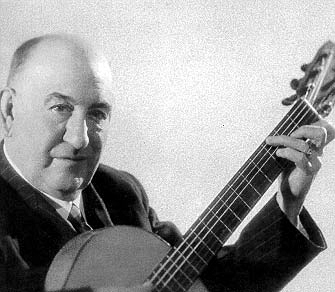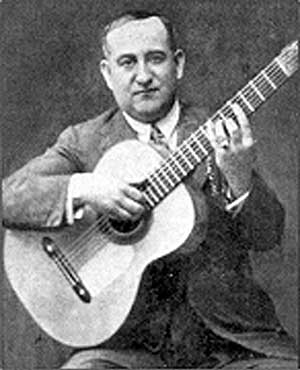<Back to Index>
- Guitarist and Composer Ramón Montoya, 1880
- Guitarist Paco Peña, 1942
PAGE SPONSOR


Ramón Montoya (November 2, 1880, Madrid, Spain – June 20, 1949, Madrid, Spain), Flamenco guitarist and composer.
Born into a family of Gitano (Romani) cattle traders, Ramón Montoya used earnings from working in the trade to buy his first guitar. He began playing in the cafés de cante before he was twenty years of age.
He formed a partnership with the great flamenco cantaor (singer) Antonio Chacón that starting in 1912 lasted more than a decade. Both participated in the Concurso de Cante Jondo of 1922 held in Granada. These two were largely responsible for establishing the form of the various traditional flamenco cantes that are recognized today.
In traditional flamenco, the guitar was relegated to a supporting role. Cante (singing) and baile (dance) were the main performers whom the guitarist supported. Montoya was one of the first to challenge this role. His strong playing often overpowered the singer whom he accompanied. He eventually took the next logical step and began to play as a solo or lead performer in a concert setting. His performances are widely credited by flamenco historians as establishing the flamenco guitar in this role.
He was the single most influential flamenco guitarist of the 20th century. His innovations made possible the solo careers of such later greats as Sabicas, Paco de Lucía and Tomatito.
Uncle of the flamenco guitarist Carlos Montoya.

Paco Peña (born 1 June 1942) is a Spanish flamenco guitarist. He is regarded as one of the world's foremost traditional Flamenco players.
Born in Córdoba, Spain as Francisco Peña Pérez, Paco Peña began learning to play the guitar from his brother at age 6 and made his first professional appearance at 12. Encouraged by his family, he left home and began performing throughout Spain with a government sponsored folk music and dance program. This led to calls from professional Flamenco companies in Madrid and the Costa Brava, where Peña established himself as a highly regarded accompanist to Flamenco dance and singing. However, dissatisfied with life on the coast and seeking a new challenge, he moved to London in the late 1960s to become a soloist. Initially the star attraction in the Restaurante Antonio in Covent Garden, Peña generated so much interest among a British public previously uninitiated in Flamenco that he soon found himself sharing concerts with artists such as Jimi Hendrix, and made his solo debut at Wigmore Hall in 1967. It was not long before Peña was touring the world, both as a soloist and an accompanist with performances at Carnegie Hall in New York City, the Royal Albert Hall in London and the Concertgebouw in Amsterdam. He later founded the world's first university course on flamenco guitar, at the Rotterdam conservatory of music.
Peña also created the Centro Flamenco Paco Peña in Córdoba, and was responsible for the founding of the now celebrated annual Córdoba Guitar Festival, which has seen appearances by other Flamenco greats such as Manolo Sanlúcar and Paco de Lucía.
In 1997 Peña was named Oficial de la Cruz de la Orden del Mérito Civil by King Juan Carlos of Spain.
His most famous compositions include his Misa Flamenca, a Flamenco Mass and Requiem for the Earth, both of which have received great critical acclaim.
He has also had a number of notable collaborations, significantly with the guitarist Eduardo Falú and the Chilean group Inti - Illimani.
Paco Peña has homes in London and Córdoba. His most recent show is Flamenco Sin Fronteras (2009), which explores the relationship between Venezuelan music and Flamenco.
Peña is a good friend of classical guitarist John Williams, and they have frequently played concerts together.